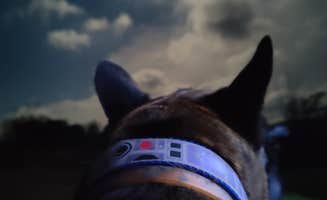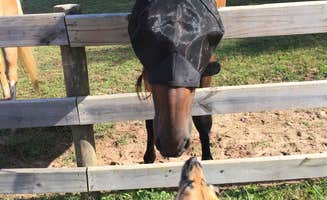Equestrian camping near Cisco, Georgia offers access to extensive trail systems through the Cohutta Wilderness. The region sits at elevations between 1,200 and 4,200 feet with a mix of hardwood forests and mountain streams creating natural water sources. During summer months, temperatures average 75-85°F during the day, dropping to 55-65°F at night.
What to do
Trail riding connections: Access multiple wilderness trails directly from Jacks River Fields Campground, which provides both equestrian and non-equestrian camping options. "There's a hiking trail that connects to the Benton McKaye just across from campsite and if you are a bringing horses there are two paddocks for them as well," notes Liz B.
Overnight backcountry rides: Plan multi-day trips using the campgrounds as base camps. Hickey Gap Campground provides access to deeper wilderness areas. "There's a giant waterfall down the trail if you can make the trek," explains Julia B., highlighting attractions accessible from the equestrian-friendly area.
Creek swimming spots: Cool off after trail rides at creek access points. Bob P. describes Jacks River Fields as having "Horse camp on one side and creekside camping on the other," making it ideal for both riders and horses to refresh after trail time.
What campers like
Natural water access: Equestrian campers appreciate stream access for both personal use and horse watering. At Lost Corral Horse Camp, "you don't have a direct view of the water, but do have access to it," notes Candy O., describing the practical amenities riders need.
Basic but functional facilities: Horse campgrounds focus on practical needs rather than luxury amenities. Bob P. describes, "Level spots with picnic tables. Not directly on the river but is accessible. A lot of equestrians stay here but anyone can."
Riding community atmosphere: The shared interest in horses creates a communal environment among campers. The campgrounds attract riders with similar interests, creating opportunities for sharing trail information and experiences.
What you should know
Site preparation: Pack appropriately for primitive camping conditions. Mike H. from Hickey Gap advises, "There was a pit toilet with plenty of toilet paper and it was quite clean. There's also a bear box and signs clearly indicating there are bears around and that you should keep all food in your vehicle or use the box."
Road conditions: Access roads to horse camps can be challenging. "The road up there is all rock/dirt with a several hundred foot drop-off on the right side and no guardrail. There were a few hairpin turns," warns Mike H. about approaching Hickey Gap, information particularly important for those hauling horse trailers.
Wildlife awareness: Prepare for encounters with local wildlife. Bob P. cautions, "I saw 3 copper heads at the creek," highlighting the need for awareness around water sources where horses and humans gather.
Seasonal planning: Horse camping is weather-dependent, with spring and fall offering the most comfortable temperatures. Summer heat can be intense on exposed trails, while winter brings occasional snow and ice at higher elevations.
Tips for camping with families
Mixed-use options: Some horse campgrounds welcome non-equestrian families. At Sawmill Lake Campsite, Mitchell M. found "a very nice and open area to camp at," noting the campground's versatility for different camping styles.
Water activities: Combine horseback riding with water recreation. John B. notes about Hickey Gap, "There is a beautiful waterfall about a mile down trail from camp and tons of great swimming areas!"
Cave exploration: Some areas offer additional activities beyond horseback riding. Lisa mentions about Sawmill Lake, "This is a nice primitive camp site just a 2 min walk from Petty John Cave and a 5 min drive to Rock Town Trailhead. Come here to try your hand at rock climbing and spelunking."
Tips from RVers
Access challenges: RV access to horse camps requires careful planning. For Sawmill Lake, Sierra Y. advises, "I came from the west and had no problems getting my 23ft camper up the mountain," but notes, "Trees fall easily so if it's windy be careful where you park."
Permit requirements: Check for necessary permits before arrival. "You do need a land pass to be here, the website is on the sign coming in and it was around $60," explains Sierra Y. about Sawmill Lake Campsite.
Alternative accommodations: When horse campgrounds are too primitive, consider nearby options with more amenities. Track Rock Campground offers both equestrian facilities and RV hookups, with Jessica M. sharing, "Our 1st ever, in a 38' Class A. We were nervous about parking and getting set up- but they helped us get a spot that was easy to pull into."



